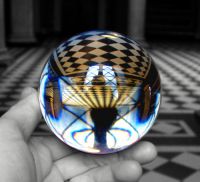The Cult of the Novel
 |
The Mad Artist explores a literary context for contemporary entheogenic visionary experience:
What do you do if you've undergone a profound, like-changing mystical revelation and you want to articulate it in a way that's workable, comprehensible and will make people take you seriously and not simply dismiss you as a headcase? Unless you already have an appropriate platform in place, it's not an easy one. Within evangelical churches, most everybody is a visionary and their visions have a uniformity of focus and topic. Outside of such accepted institutionalised frameworks, highly vocal 'visionaries', perhaps infected with manic zeal -- that certainty that the whole outside world must be automatically tuned into your special wavelength -- and publicly acting out accordingly, might well find themselves being dealt with under the Mental Health Act. Labelling religious zealots as 'lunatics' has proved doubly convenient for societies throughout the ages, since the visions can be written off as ravings and the subjects can, if needs be, contained through incarceration, medication or both. And if the visions happen to be drug induced, then this is an even greater reason for their rejection by the world at large.
In the autumn of 1979 I underwent a three-week epiphany, an elevation into a higher, cosmically connected visionary space as a result of two medium-dose psilocybin mushroom trips taken close together. I imposed a Zen Buddhist, neoshamanistic context on the experience, as they were my preoccupations at the time. So in those terms I had achieved satori, become enlightened, attained a foothold in Ultimate Reality, which was the same as ordinary reality since the Cosmos had become an undifferentiated whole. In a more conventionally religious context, I could be said to have 'found God'.
|

Recently @ DoseNation
|
|






















The comments posted here do not reflect the views of the owners of this site.